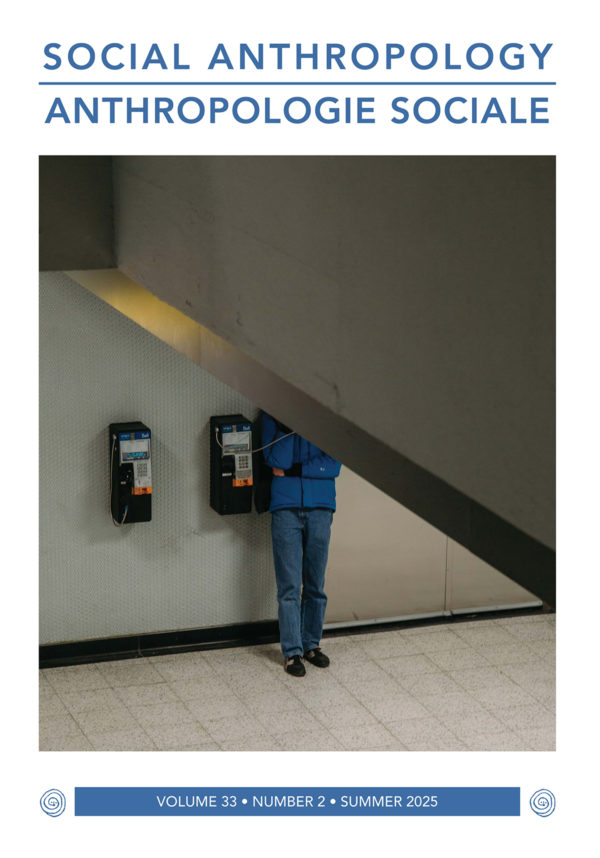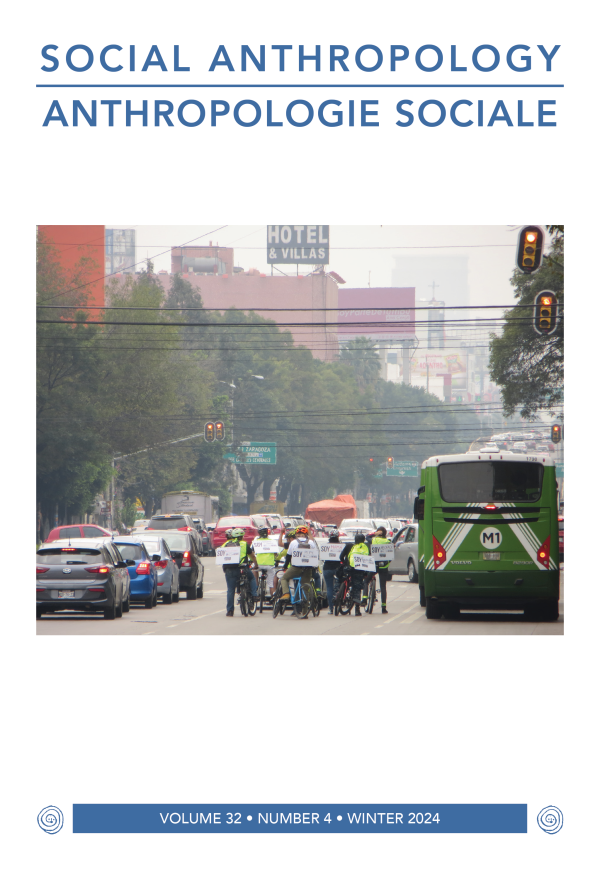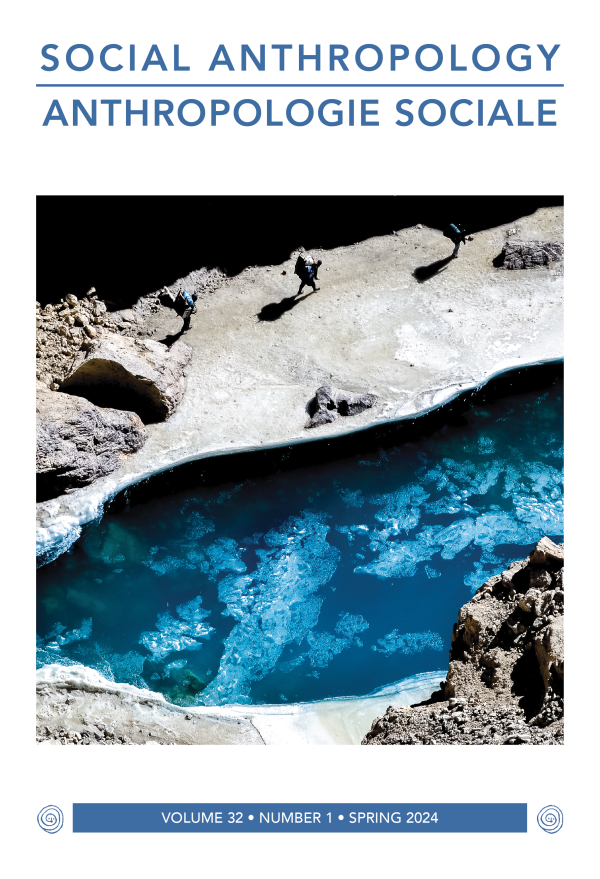Social Anthropology/
Anthropologie Sociale
SA/AS is the journal of the European Association of Social Anthropologists (EASA). In synergy with EASA’s goals, our journal strives to facilitate exchange and debate among anthropologists, and between academia and the wider world.
The editorial team and the advisory board envision SA/AS to be a platform hosting interventions into any debate that animates current anthropology and that contours its possible futures. To that end, the journal accommodates a variety of formats, from stand-alone research articles over special issues all the way to review articles and book reviews. In order to foster lively, discipline-defining exchanges, the editorial team now also welcomes themed sections and debates.
It publishes key contributions by both established and up-and-coming anthropologists. As part of the intellectual vitality of the Journal, it also features an exciting Debate in every issue, an important Review Essay which discusses outstanding books in adjoining disciplines or in public debate from an anthropological point of view, and a thriving Book Reviews Section.
SA/AS (ISSN 0964-0282) is published by Berghahn appears four times a year (in February, June, September and November) with four parts forming a volume.
Like the association, the journal strives to facilitate exchange and debate among anthropologists, and between academia and the wider world. The editorial team and the advisory board envision SA/AS to be a platform hosting interventions into any debate that animates current anthropology and that contours its possible futures. To that end, the journal accommodates a variety of formats, from stand-alone research articles over special issues all the way to review articles and book reviews. In order to foster lively, discipline-defining exchanges, the editorial team now also welcomes themed sections and debates.
Across all these publication formats, the journal is committed to cutting edge research. Successful research articles – either stand-alone or parts of collections – build on fieldwork in all parts of the world, pursuing any conceivable modality of research. They develop rich data sets into ambitious and theoretically innovative interventions into current or classic debates. To secure academic rigour as well as innovative character of all output, the journal makes full use of a double-blind peer review system. Publication projects are overseen by an enthusiastic editorial team, bringing diverse expertise, regional affiliations and career stages to the journal, supported by dedicated staff at Berghahn.
The journal is fully committed to inclusive approaches and pushes these on all levels. That means that we actively seek to diversify the group of authors and reviewers in terms of gender, geographical location, affiliation or career stage. It also means that the journal is now fully open access (OA), making all its articles accessible to everyone.
About the journal
SA/AS (ISSN 0964-0282) appears four times a year (in February, June, September and November) with four parts forming a volume.
SA/AS publishes articles in English and French which are selected by a process of peer review. Selection is anonymous and based solely on a manuscripts’ innovative interest to the theory, methodology and / or practice of anthropology. The journal has been ranked category A in the European Reference Index for the Humanities (ERIH). The articles are complemented by book reviews, and successive reviews editors have taken especial care to match books and reviewers across European boundaries.
The journal was published by Wiley Blackwell Publishing from 2007-2021 and moved to Berghahn in 2022. The journal has achieved subscription status at all major University Libraries in Europe, North America, and most of Australasia. Social Anthropology/Anthropologie Sociale is the most widely circulated anthropological journal of European provenance.
Latest news
Please help us in keeping the journal Open Access by supporting institutional subscriptions. Recommend the journal to your library by contacting your librarian. The Journal is Open Access to individuals but relies on a model of S2Open.
Editorial board
Editors
Dimitra Kofti, Panteion University, Greece
View profile
Arne Harms, Max Planck Institute for Social Anthropology, Germany
View profile
Leonardo Schiocchet, Charles University, Czech Republic
View profile
Martin Fotta, Academy of Sciences, Czech Republic
View profile
Book Reviews Editor
Magdalena Craciun, University of Bucharest, Romania
View profile
Assistant editor
Ville Laakkonen, Tampere University, Finland
View profile
EASA Editorial board
Alexandra Oancă, PrecAnthro/KU Leuven
View profile
Ana Ivasiuc, PrecAnthro/University College Dublin
View profile
Fabiola Mancinelli, Universitat de Barcelona
View profile
Hayal Akarsu, Utrecht University
View profile
Jonas Tinius, Humboldt-Universität zu Berlin
View profile
Maarja Kaaristo, Tallinn University/Manchester Metropolitan University
View profile
Panas Karampampas, Durham University/EuroNet
View profile
Latest news
Please help us in keeping the journal Open Access by supporting institutional subscriptions. Recommend the journal to your library by contacting your librarian. The Journal is Open Access to individuals but relies on a model of S2Open.
How to access the journal
Subscribe to open access
As you know, Social Anthropology is a part of the Berghahn Open Anthro – Subscribe-to-Open initiative which requires adequate library support every year for the upcoming volume to be open access. Please help us sustain our collective mission of equity and retain open access status for 2025 and beyond by encouraging your institution’s library to subscribe. As a member of EASA, you are an invaluable part of the journal and your support in this endeavor is crucial to its success.
Thank you in advance for your help.
S2O FAQ
Latest news
Please help us in keeping the journal Open Access by supporting institutional subscriptions. Recommend the journal to your library by contacting your librarian. The Journal is Open Access to individuals but relies on a model of S2Open.
Journal issues
Latest issues
Notes for contributors
Authors should submit their papers to Social Anthropology/Anthropologie Sociale online through Open Journals Systems, open source journal management and publishing software developed, supported, and freely distributed by the Public Knowledge Project. To submit your manuscript online, please visit the Submissions page.
If for any reason you cannot use the online system, please contact the journal editors at saas(at)berghahnjournals.com. Articles should be no longer than 7000 words, including references and notes, but excluding the abstract. After the first round of revisions, the word limit can be increased to 8000 words.
Latest news
Please help us in keeping the journal Open Access by supporting institutional subscriptions. Recommend the journal to your library by contacting your librarian. The Journal is Open Access to individuals but relies on a model of S2Open.
Special issue guidelines
Social Anthropology / Anthropologie Sociale aims to publish one special issue per year. Special issues are collections of articles plus an introduction that together advance a novel debate, idea or field in social anthropology. People interested in publishing a special issue are advised to consider the following guidelines.
- Aspiring guest editors of a special issue send a proposal to the journal editors at sa-as@easaonline.org. This proposal includes a two-page outline of the overall theme of the collection, pointing out in particular (a) what is new and noteworthy about this particular collection, and (b) what the advantage is of making this point through a collection of articles, rather than by publishing the articles in different outlets. The proposal also includes a list of prospective articles and their authors, with one-paragraph summaries of their contents and relevance for the overall special issue.
- Alongside an introduction (up to 4000 words), a special issue contains 4-6 individual articles (7000 words each).
- Special issue proposals will be considered twice a year. The first round will consider proposals submitted until January 1st, the second will consider proposals submitted until July 1st.
- If the editorial team decides to take the collection forward, they will agree on a publication schedule with the guest editors. From acceptance of the proposal to the publication of the special issue, a time frame of one to two years is likely. It is important that both the guest editors and individual contributing authors strictly adhere to the schedule. It is the guest editors’ responsibility to communicate deadlines and format with the contributing authors
- All articles will be submitted to the journal by their authors via Manuscript Central. All articles go through individual peer review. The acceptance of the special issue as a whole does not guarantee that all its articles make it through peer review.
- Reviewers’ reports will be shared with guest editors, and editorial decisions made in collaboration between the journal’s editors and the guest editors.
- If a critical number of articles have been accepted after peer review, guest editors will submit an introduction to the journal via Manuscript Central.
Latest news
Please help us in keeping the journal Open Access by supporting institutional subscriptions. Recommend the journal to your library by contacting your librarian. The Journal is Open Access to individuals but relies on a model of S2Open.





